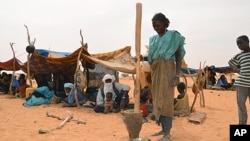The U.N. refugee agency is warning that a growing refugee crisis in northern Mali is still at an early stage, but says the situation is rapidly deteriorating. The UNHCR says it is stepping up aid efforts to help thousands of people fleeing clashes between Tuareg rebels and the Malian army into neighboring countries.
Supplies arriving
The U.N. refugee agency reports the first of four scheduled cargo flights, carrying 300 tents, landed in Nema, Mauritania early Friday morning local time. It says subsequent flights will carry thousands of additional tents destined for Mauritania, Niger and Burkina Faso.
It also says two trucks carrying 40 tons of sleeping mats, blankets, jerrycans and other basic relief items are currently on the way from Accra, Ghana to Niger. They are due to arrive by the middle of next week. The UNHCR says future road convoys are being organized.
U.N. refugee spokesman Adrian Edwards said the UNHCR is doing its best to respond quickly to the deteriorating situation, which is still unfolding in Mali. “In the wake of the crisis in Libya last year, there has been this sudden uptick in violence. We have all seen these reports of the rebels fighting being heavily armed. The full story, I think, is still going to come out of this," he said. "But, clearly, you have gone back to a situation in Mali of rebellion, of violence. We have seen this before in Mali. Now, it is having an effect, not just on Mali itself, but across a wide geographic area bringing in several countries.”
Hundreds return to Mali
Hundreds of Tuaregs recently returned to Mali from Libya. Many had fought alongside troops loyal to former Libyan dictator, Moammar Gaddafi and they returned home carrying tons of weaponry from the Libyan conflict. Upon their return they renewed a long-simmering rebellion against the Malian government with a series of attacks on towns in north Mali on January 17.
Since then, the UNHCR says about 30,000 people have fled into Niger, Burkina Faso and Mauritania. Spokesman Edwards says it is important to note that not all these people are refugees or asylum seekers. With Niger, for example, he says some of those returning are Niger nationals who have been working in Mali for some time.
“You also have in Burkina Faso, for example, people who are from Mali, but have lived in Burkina Faso doing business there. They are now bringing their families out of Mali. So, it is a mixed migration.… but, it is rising in numbers quite rapidly. These are impoverished areas. There are food, there are water shortages already, particularly in northern Niger. It is a situation that does need aid. It does need addressing pretty fast,” Edwards stated.
Edwards notes UNHCR’s mandate relates primarily to helping refugees and asylum seekers. But, he says the agency normally also provides aid to local people so as not to create hostility within host communities who are likely to be poor and in need of assistance, as well.
He says the fighting in northern Mali and the resulting refugee crisis will likely get worse, adding to the region's woes.












